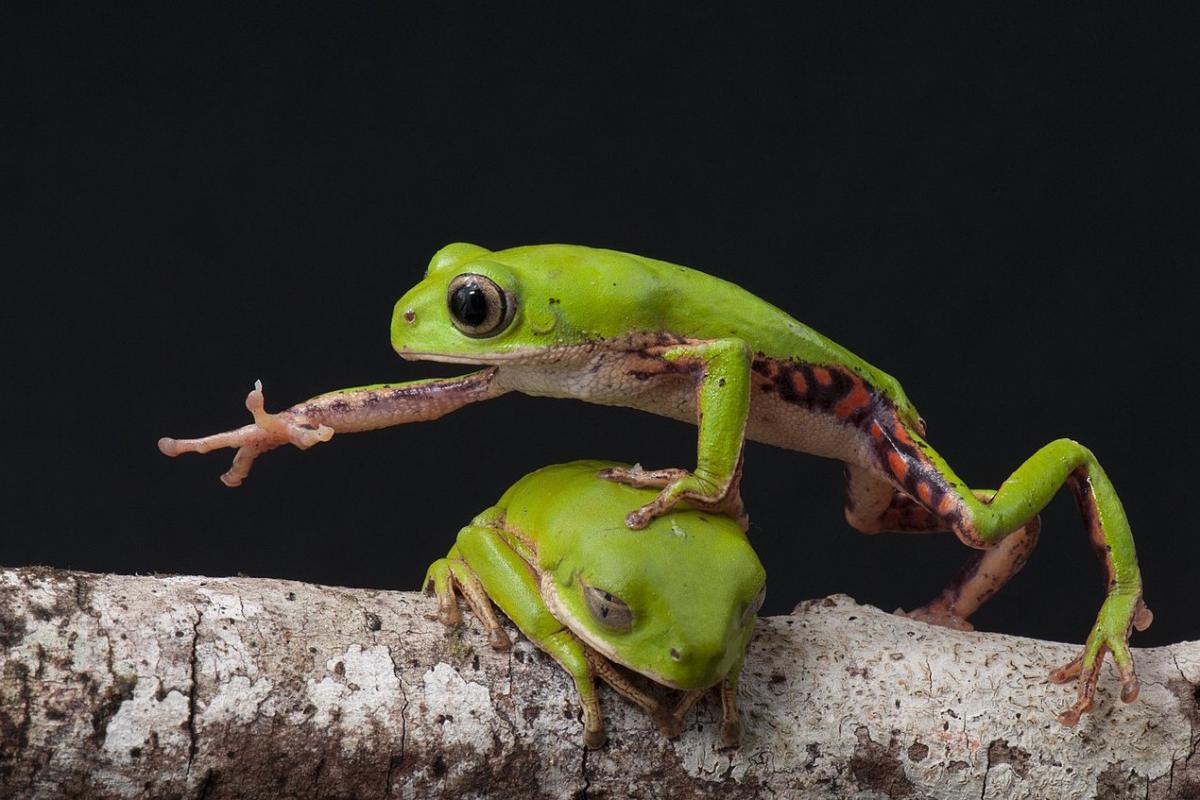It takes about twenty-four hours for a frog to digest food and excrete waste. Digestion occurs with the help of digestive enzymes secreted by glands in the stomach walls.
Frogs have a unique digestive system that allows them to efficiently break down their food. Located on the left side of the body cavity, the stomach is attached to the dorsal body wall by a mesogaster. The ingested food is digested with the assistance of digestive enzymes secreted by glands in the stomach walls.
This process typically takes around twenty-four hours for the food to pass through the frog’s digestive tract and be excreted. Frogs have evolved to efficiently process their food, ensuring their survival in the wild.
Frog Feeding Fundamentals
|
Frogs have a unique digestive system that allows them to break down food quickly. The stomach, situated on the left side and attached to the body wall, uses digestive enzymes for food breakdown. Most frogs lack teeth but catch prey with sticky tongues. Once swallowed, food takes about 24 hours to pass through the digestive tract. Some species can digest food in less than two hours. Despite the swift process, frogs cannot vomit, so they eject their stomachs to remove indigestible items. |
Digestive Journey In Frogs
The digestive journey in frogs starts from the mouth, where the initial phase of digestion occurs. The food then moves to the stomach, which is located on the left side of the body cavity and is attached to the dorsal body wall by a mesogaster. In the stomach, the ingested food is broken down with the help of digestive enzymes secreted by the digestive glands in its walls. The stomach acid plays a crucial role in digestion, as it aids in breaking down the food. The entire process, from start to finish, takes less than two seconds, and most of that time is spent repositioning the tongue and hyoid after catching prey. After ingestion, it takes about twenty-four hours for the food to pass through the frog’s digestive tract and be excreted. Additionally, most frogs have short, pointed teeth for gripping prey, but “true toads” in the family Bufonidae have no teeth at all.
The Breakdown Process
The breakdown process
Frogs start digesting their food with the help of digestive enzymes secreted by the digestive glands in their stomach walls. The partial digestion process begins even before the food reaches the intestines.

Credit: www.petmd.com
Through The Intestines
A frog’s digestion process typically takes around 24 hours to complete, starting from the stomach and moving through the digestive tract. Digestive enzymes assist in breaking down food within the frog’s system efficiently.
A frog’s digestive system consists of the stomach and intestines. The stomach is located on the left side of the body cavity and secretes digestive enzymes to break down food. From there, the partially digested food passes through the small intestine, where most of the nutrient absorption occurs. The length of a frog’s small intestine varies depending on the species, but it is generally shorter than that of humans. Once the nutrients have been absorbed, the waste products move into the large intestine and eventually out of the body through the cloaca. It typically takes about 24 hours for a frog to digest its food and excrete waste. While frogs do not have teeth, they catch prey with their sticky tongues and swallow it alive.Timeframe For Digestion
When it comes to digestion in frogs, the stomach plays a vital role. The stomach of a frog is located on the left side of the body cavity and is attached to the dorsal body wall by a mesogaster. Digestion of the food occurs with the assistance of digestive enzymes secreted by the digestive glands found in the walls of the stomach. The average digestion duration for frogs is around 24 hours, during which the food travels through the digestive system and is eventually excreted.
Several factors can affect the digestion time of frogs, including the type of food, the size of the meal, and the temperature of the environment. For example, if a frog consumes a large meal, it will take longer to digest than a smaller meal. Additionally, the temperature of the environment can also have an impact on the digestion time, with warmer temperatures resulting in faster digestion.
In conclusion, the digestion process in frogs is a complex and important process that is influenced by various factors. By understanding the average digestion duration and the factors affecting it, we can better appreciate the digestive system of these fascinating creatures.

Credit: indianapublicmedia.org
Excretion: The Final Step
When it comes to digestion, frogs have a fascinating process. After swallowing their prey whole, the food enters the stomach, where digestive enzymes help break it down. From there, it takes about 24 hours for the food to move through the digestive tract and be excreted. This entire process, from ingestion to excretion, occurs relatively quickly, with most of the time spent repositioning the tongue and hyoid during feeding. Unlike humans, frogs can’t vomit, so they have a unique way of ejecting their entire stomachs to remove unwanted contents. As a result, the entire digestive process, including digestion and excretion, happens efficiently within a short period.
Unique Aspects Of Frog Digestion
Frogs’ inability to vomit: Unlike humans, frogs are unable to vomit. This is due to their unique digestive system, which lacks the ability to reverse the movement of food.
Adaptations for digesting live prey: Frogs have evolved specific adaptations for digesting live prey. Their stomachs contain strong acids and digestive enzymes that aid in breaking down the prey quickly.
Impact Of Diet On Digestion Time
The digestion time for a frog varies, with food typically taking about 24 hours to pass through their system and be excreted. The stomach of a frog contains digestive enzymes that aid in breaking down ingested food. Additionally, frogs cannot vomit, so they eject their entire stomach to expel indigestible items.
| Impact of Diet on Digestion Time |
| The size and type of prey affect digestion time in frogs. Different frog species exhibit variations in digestive rates based on their diets. Prey size can influence the duration of digestion in frogs. Some frogs process food quicker than others due to their diet. Understanding these factors can provide insights into frog digestion patterns. |
Observations And Studies
Observations and Studies: Research has provided insights into frog digestion, with X-ray observations revealing the duration of the process. It has been found that the entire digestion process, from ingestion to excretion, takes less than two seconds. This rapid process is facilitated by the frog’s ability to reposition its tongue and hyoid swiftly. While most of the digestion occurs within this short timeframe, the actual time for food to pass through the digestive tract and be excreted is approximately 24 hours. Additionally, studies have shown that certain prey, such as insects, can survive inside a frog’s stomach for 2-3 hours before being fully digested. These findings offer valuable insights into the efficiency and timeline of frog digestion.

Credit: indianapublicmedia.org
Frequently Asked Questions
How Does A Frog’s Stomach Break Down Food?
A frog’s stomach breaks down food with digestive enzymes secreted by glands in its walls.
How Fast Do Frogs Eat?
Frogs eat fast, taking about 2-3 hours to digest their food completely.
Do Frogs Have Strong Stomach Acid?
Yes, frogs have strong stomach acid to break down their food for digestion.
How Do Frogs Eat With No Teeth?
Frogs catch prey with sticky tongues and swallow it whole, as they do not have teeth.
Conclusion
Frogs have a fascinating digestive process, with food taking around 24 hours to pass through. Unlike humans, frogs lack stomach acid. Their quick digestion, less than two seconds for some species, showcases their efficient eating habits. Understanding a frog’s digestion sheds light on their unique biology.
